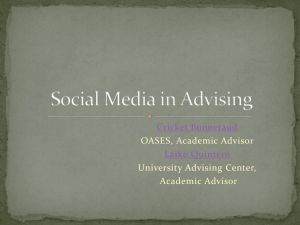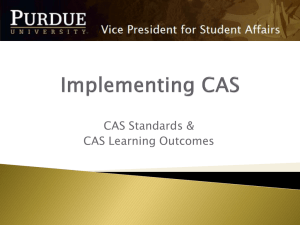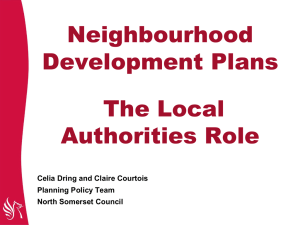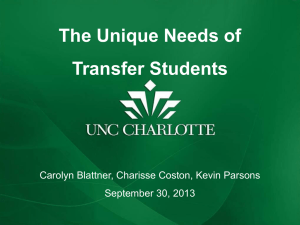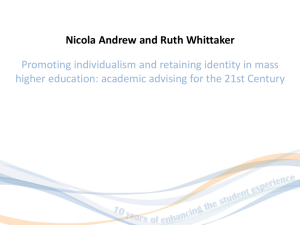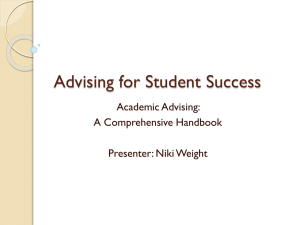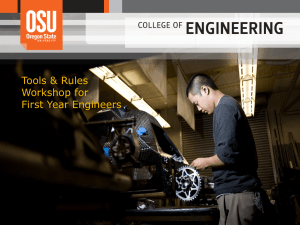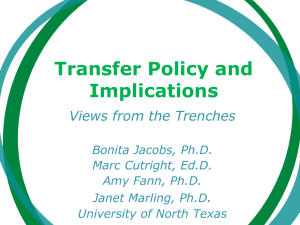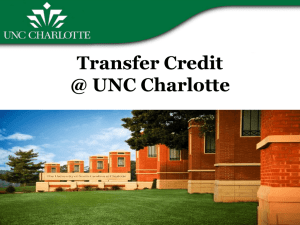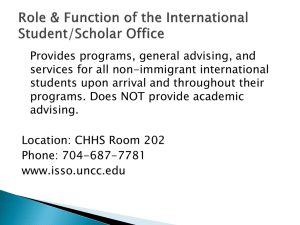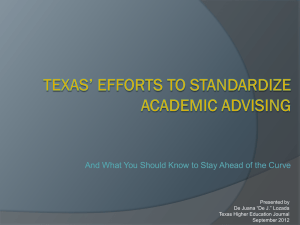Goal 1 - Virginia Western Community College
advertisement
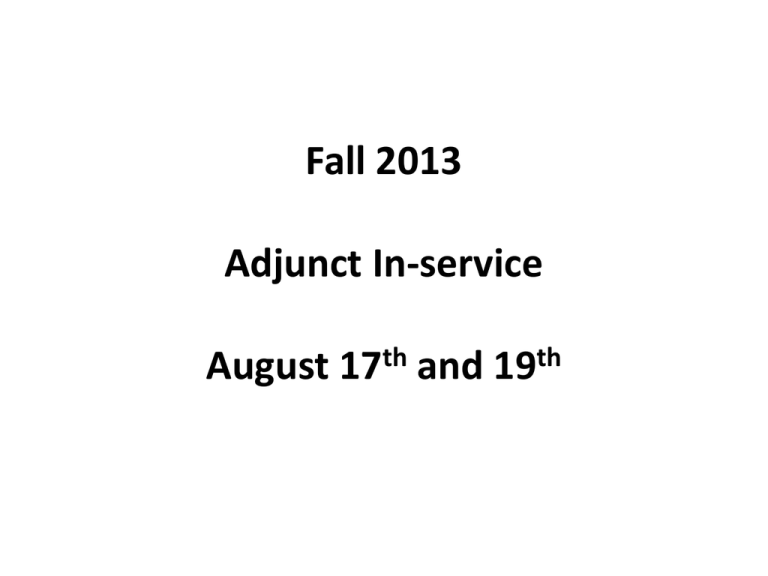
Fall 2013 Adjunct In-service August 17th and 19th Welcome and Updates Elizabeth Wilmer Restructuring of Academic Schools • 4 Academic Schools LASS - Liberal Arts and Social Sciences HP - Health Professions STEM - Science, Technology, Engineering and Mathematics BTT - Business, Technology and Trades Changes on Campus • Division Office for STEM housed in Anderson – Office of Dean John Anderson is in Anderson Hall • Center for Science and Health Professions (CSHP) opening Fall 2013 • Library renovations completed for Fall 2013 • Student Center opening Fall 2014 • Anderson Hall will be replaced Strategic Planning and Institutional Effectiveness Institutional Effectiveness Implementation Cycle ReVISION 2015 Adjustments and Resource Requests Evaluate, Review and Improve “Close the Loop” on the Assessment Cycle Feedback from Stakeholders, Students, Faculty, Graduates, Employers, Transfer Institutions, Community Mission And Institutional Goals Institutional Success Implement Plans And Conduct Assessment Budget Allocations College Divisions Mission and Purpose Division Goals Student Learning Outcomes Departmental Objectives Strategic Planning Timelines Vision 2013 ReVision 2015 (New Plan) Virginia Western Strategic Plans (New Plan) Achieve 2015 VCCS Strategic Plans 2008 2014 2016 2021 Planning and Assessment Overview Process Established in: Assessed Through: VWCC Mission Statement Institutional Goals Strategic Plan Institutional Core Indicators IE Plans IE Assessment Reports IE Plans IE Assessment Reports Division Goals Department / School Objectives Academic Assessments VCCS Standards and VWCC input Gen Ed Assessments Program Reviews Virginia Western Community College Mission Statement Virginia Western Community College provides affordable, accessible, and quality educational opportunities and workforce training to meet individual, community and global needs. Revision 2015 Institutional Goals Goal 1: Promote effective teaching and learning through quality instruction, programs, and services designed to meet the needs of a diverse student body. Goal 2: Cultivate relationships and partnerships with the educational community, business, industry, and government to create educational and workforce development opportunities to support economic vitality. Goal 3: Practice sound stewardship of financial, physical, and technological resources to support high quality programs and services. Goal 4: Foster a safe and secure campus environment that is conducive to learning. Revision 2015 ASA Division Goals Goal 1: Provide quality educational programs to meet student and community needs. Goal 2: Support the Institutional Effectiveness needs of the campus by providing data, assessments, and documentation. Goal 3: Provide library, testing, and academic support services to meet the needs of a diverse student body. Goal 4: Provide enrollment and retention services to meet the needs of a diverse student body. Program Assessment 2013-14 Accounting IE Plan How does the program support institutional goals? Purpose: The curriculum is designed for persons who seek employment in the accounting field. Relates to Institutional Goal: Goal 1: Promote effective teaching and learning through quality instruction, programs, and services designed to meet the needs of a diverse student body. Relates to Division Goal: Goal 1: Provide quality educational programs to meet student and community needs. What does the program do to support institutional and division goals? Student Learning Outcomes : 1. Accurately complete the steps in the accounting cycle for a business entity including the preparation of financial statements. 2. Prepare a Form 1040 and related schedules/forms for an individual taxpayer. 3. Account for the payroll of a business entity. 4. Demonstrate a well-rounded understanding of business terms and their applications. How will the department measure these objectives? Student Learning Outcomes: 1. Accurately complete the steps in the accounting cycle for a business entity including the preparation of financial statements. 2. Prepare a Form 1040 and related schedules/forms for an individual taxpayer. 3. Account for the payroll of a business entity. 4. Demonstrate a well-rounded understanding of business terms and their applications. Assessment Measures: • • • • ACC 212: Comprehensive Financial Accounting Assessment (1) ACC 261: Form 1040 Project (2) ACC 124: Payroll Project (3) BUS 100: Comprehensive Final Exam (4) How will the department know that it is achieving its objectives? IE Plan Excerpt: Student Learning Outcomes: 1. Accurately complete the steps in the accounting cycle for a business entity including the preparation of financial statements. 2. Prepare a Form 1040 and related schedules/forms for an individual taxpayer. 3. Account for the payroll of a business entity. 4. Demonstrate a well-rounded understanding of business terms and their applications. Assessment Measures: • • • • ACC 212: Comprehensive Financial Accounting Assessment (1) ACC 261: Form 1040 Project (2) ACC 124: Payroll Project (3) BUS 100: Comprehensive Final Exam (4) Proficiency: • 75% of students will make a 70 or higher on the ACC 212 Financial Accounting Assessment • 75% of students will make a 70 or higher on the ACC 261 Form 1040 Project • 75% of students will make a 70 or higher on the ACC 124 Payroll Project • 70% of students will make a 70 or higher on the BUS 100 final exam What will the department do with the information gained? Dissemination/Discussion: • The results of the assessments are discussed among the Accounting faculty during in-service each semester. General Education Assessment Review - Competencies The VCCS specifies 7 areas of general education competency for our graduates. These apply to all of our associate degree programs, and in part to our certificate programs. - Communications - Critical Thinking - Cultural Understanding - Information Literacy - Personal Development - Quantitative Reasoning - Scientific Reasoning Review - Process The VCCS assesses each competency once every several years. We use our own process to assess these competencies on a more timely basis. Our process was developed within another community college system, and has become widely used in both 2-year and 4-year colleges. Review of Process – Faculty Role - Faculty teams develop the assessment rubrics - Program faculty select key courses for each of the competencies - Instructors select assignments that will demonstrate student mastery of the competency, and submit all student work - Faculty teams assess a random sample of the collected student work (artifacts) Review - Goals Our Goals: - 100 artifacts assessed each semester for each competency - 70% of the assessed artifacts earn an assessment of Excellent or Good Our Results Spring 2012: Problems with Personal Development Rubric Fall 2012: Continuing problems with Personal Development Rubric Most areas had issues with the selected assignments not meeting the rubrics Spring 2013: Meeting target numbers in almost all areas Much better alignment of assignments and rubrics Blue: Met Standard. Assessment of Excellent or Good Yellow: Close to Standard. Assessment of Acceptable Red: Did not Meet Standard. Assessment of Needs Improvement Results Summary We are meeting or close to meeting our initial standard for success in most competencies. - Results in Personal Development may improve based on better alignment of selected assignments and the rubric - Consistently poor results in Information Literacy Plan for 2013-14 Assessments will take place at the beginning of the following semester. For Fall 2013, we will gather assignments as usual. - These will be assessed at the beginning of Spring 2014. Fall 2013 For Fall 2013, the faculty on assessment teams will: - Review the rubrics - Encourage submission of assignments - Make recommendations based on the results Overall Our general education assessment process works. Now we can focus on using the results. Please continue to submit general education assignments for assessment! Assessment Information • It is imperative that we have all requested information at the time of the site visit • If you are asked by your program head to provide documentation, deadlines are crucial. IRB What is an IRB? An Institutional Review Board (IRB) is required by the federal government for any institution that engages in research involving human subjects. The IRB is designed to protect the rights of the human subjects. IRB Definitions Research involving human subjects must be approved by the IRB prior to beginning the research. An IRB cannot retroactively approve a project. Federal definitions for research and human subjects are trickier than you might think. Surveys frequently meet the definition of research Students are human subjects! When to contact the IRB - If you think that your project may be research involving human subjects, contact the VA Western IRB. Carol Rowlett, Chair Marilyn Herbert-Ashton, Co-Chair - If you are contacted by someone else who wants to conduct research, such as surveying your students, refer that person to the VA Western IRB as well. Reaffirmation Update SACSCOC Reaffirmation Timeline • June 4-5 – Steven Sheeley, SACSCOC VP, visited campus • August 2013 – Focused Report and QEP submitted • October 1-3, 2013 – On-Site Visit • January-March, 2014 – Response Report submitted • June 2014 - Reaffirmation Some Standards Reviewed at All On-Site Visits • 2.8 – Faculty • 3.3.1.1 –Educational Programs • 4.1 – Student Achievement • 4.5 – Student Complaints Standards that will be Reviewed Based on the Off-Site Report • 2.7.3 – General Education • 3.7.1 – Faculty Competence • 2.9 – Learning Resources and Services • 3.8.1 – Learning Information Resources • 2.11.1 – Financial Resources • 3.8.3 – Qualified Library Staff • 3.3.1.5 – Community Service • 3.10.3 - Control of Finances • 3.4.5 - Academic Policies • 4.8.3 – Distance Learning – Notification of Student Charges What to Expect at the On-Site • Know the mission and how your department and division support the mission of the college • Understand how your academic assessments fit into the IE cycle • Program Assessments • General Education Assessments • Be informed about the QEP • Student Services are available to ALL students (on-campus, distance and dual enrollment) What to Expect at the On-Site • We want to make a good impression • If you see a committee member on campus, be polite and say hello • Be open, positive and honest • Make sure your responses address the specific question asked. • Focus on our model of continuous improvement Quality Enhancement Plan (QEP) What issues do our QEP address? • Student issues – Confusion about role of advisors and advising. – Reliance on advising staff to do things for them. – Inconsistent academic planning . – Missing connections between self-exploration and educational goals, and between educational goals and program choice. What issues does our QEP address? • VA Western issues – Congested Advising Center during peak registration times. – Overwhelmed advisors doing things for students rather than fostering student responsibility. – Overloaded and underutilized faculty advisors. – Inconsistent communication regarding advising. – Desire to improve student retention and success rates. Get THERE Through Team Advising Purpose: To enhance student success through improving students’ academic planning skills. Primary Goal: To foster student success through improved academic planning skills. Secondary Goal: To develop an advising culture that supports student success. Progressive Advising Progressive advising focuses on the student as a whole person, and emphasizes goal exploration and program choice while considering students’ abilities and external obligations. This is in contrast to prescriptive advising, where advisors work most closely with students on actual course selection and scheduling. Advising Team • Advising Specialists – provide progressive advising, primarily for new students. • Advising Liaisons – provide general advising to continuing program-placed students. • Faculty Advisors – provide detailed program advising. • Students – develop responsibility for educational choices. What do we want students to do? • Through progressive advising, new students will be encouraged to choose a goal in line with their interests, abilities, and resources. • Through the registration room, students will understand how to navigate SIS. • Through SDV, students will develop a pathway to achieve the goal they have chosen. Advising Team Flow ** Incoming STUDENTS ** Advising Specialists Advising Liaisons Faculty Advisors - in Chapman Hall - focus on progressive advising - primarily new students - near School offices - focus on general advising within their School - primarily returning, program-placed students - detailed advising within their program - discuss career choices and transfer options - complete grad apps This is a generalized flow. Students may meet with any other member of the advising team at any time. Implementation Actions • Initially – Registration Room and accompanying survey • For 2013-2014 – – – – Advising Committee Advising Resources SIS changes Professional Development • Thereafter – Implement SDV Revisions – Master Advisor Awards – Case Management System – Continued Professional Development Technology SAILS • System Office Purchase (NOT part of Navigate) • Pilot in Fall 2013 and roll-out in Spring 2014 • Faculty can flag students to – Indicate poor performance (poor attendance, lack of preparation prior to class, etc.). – Provide kudos for excellent work. • Flag will initiate email to student from instructor. • Integrates with SIS. Technology Starfish Connect (Case Management System) • Part of Navigate plan. • Other VCCS schools are purchasing . • Connects members of the advising team. • Notes can be left about what was discussed in advising sessions. • Appointments can be made with faculty advisors – works with Outlook. • Offers a Kiosk function for Advising Center. • Integrates with SIS, Blackboard and TutorTrac. Sheri Meixner Intervention Counseling Services Natalie Talbott Help Desk Help Desk Hours: Monday – Thursday, 7:45 a.m. to 7 p.m. Friday – 7:45 a.m. to 6 p.m. Location: M273, Business Science Building Ways to reach us: Phone (77354); Live Chat; E-mail (helpdesk@virginiawestern.edu) and Walkup Help Desk Website: virginiawestern.edu/iet/helpdesk **** Contact us for any type of help you may need **** Topics for Today • Virtual Desktops/Cloud Computing • Thin Clients • VWCC WiFi What is a hosted desktop? • A connection to a Microsoft Windows based server, which allows you to run Microsoft Office plus other applications from the server. • The server is hosted, run, delivered and supported by a central location (IET). • The server can be accessed by desktops, laptops, thin clients and home computers; basically any computer connected to the Internet. (it’s like having your desktop computer or laptop on a server you can access anywhere…) Advantages of a Hosted Desktop • Multiple operating systems can be accessed (essentially operating systems become virtual applications) • Can use Outlook Client • Can get to VWConnect - Sharepoint • Multiple operating systems can exist on the physical computer • Access to your data from anywhere that has Internet access • Access to standard software • Processing is done on the host server • Software upgrades are quicker and easier • Remote printing • Mobile device support – tablet, Ipad, Smartphones • Remote Help Desk support • Green computing How do you access your Hosted Desktop? • From Home, you can install the Virtual Desktop Software, which is VMWare. (already on VWCC owned computers and laptops) **high speed Internet suggested** OR • Using a Thin Client on campus What is a Thin Client? • Thin Client – a computer that serves as a gateway for you to access your hosted desktop • The most common type of modern thin client is a low-end computer terminal which concentrates solely on providing a graphical user interface to the computer with no hard drive or other features other than maybe USB ports. What does a Thin Client look like? Why do you need to know about Thin Client technology? • All adjunct offices have Thin Clients How do you log onto a Thin Client on VWCC campus? • Use your normal Windows/VWCC Network Login and password What does an error message of “unavailable” mean? • You may not have Hosted Desktop access – contact the Help Desk • Be sure to logout of your hosted desktop wherever you are accessing it – home, adjunct office, café down the street, etc. VWCC WiFi Our wireless network is called VWCCWiFi and requires an initial setup, plus login credentials. • The login credentials are your MY VWCC username and password. • Setup instructions are available based on device operating system. Windows—requires the installation of a certificate as well IOS (Iphone, Ipad, Ipod Touch) Android OS X (Macbook) Don’t forget—Contact us before you get frustrated …. The Help Desk is here to serve you! Chris Porter Learning Technology Center The purpose of the Academic Link is simple: Connecting students to academic success by supporting the acquisition of critical learning skills through services and supports that are focused on assisting students in becoming better learners. One-on-One/Group Tutoring The one-on-one/group tutoring program provides individual and group tutoring services for students who need intensive, ongoing assistance in a particular. The one-on-one program goal is to provide assistance to any student who needs it in any subject. The Math Center The Math Center is a walk-in tutoring service where students can get immediate help with math problems in most math subjects on a first-come, first-served basis. The Writing Center Like the Math Center, the Writing Center is a walk-in service where students can get help with papers they’ve been assigned to write, regardless of the subject in which the paper was assigned. Students are served in the Writing Center in half-hour increments on a firstcome, first-served basis. Online Tutoring Online tutoring will be introduced soon after the beginning of the semester and will be available to distance and dual-enrolled students through the one-on-one/group tutoring program and the Online Writing Center. Academic Skills Coaching The Academic Skills Coach provides students with individualized coaching in the skills and strategies that lead to academic success. Leah Coffman +50 Grant The Plus 50 Encore Completion Program: VWCC’s Gateway to Success for Ageless Learners American Association of Community Colleges Funded by Deerbrook Charitable Trust Deborah Yancey Dean of Business, Technology and Trades Rosters & Forms • • Deadlines are Crucial No-Show Roster– September 9th • • Withdrawal Rosters— October 26th • • is used to report any student that has never attended an in-class or made session or made contact with a distance learning faculty member. Students who violate the attendance or participation guidelines of the course as of the deadline will be withdrawn with a grade of a “W” on their transcript. Class Rosters • Check regularly in PeopleSoft SIS throughout the entire semester. Start of the semester • Digital format of your syllabus • ABC XXX – Course Title Semester Year • • • • • Instructor: Office: Email: Phone: Office Hours: • • • • • • • • • Contact Methods and Response Time • Penalties for Academic Honesty Violations: • Inclement Weather Schedule: COURSE POLICIES Attendance: Grading: Make-Up/Late-Work Policy: Blackboard Due August 21st at 8:00 am • Make sure your course is available • Post your syllabus and course outline • Do not remove links for student support services, policies etc. Campus Safety Video • Show the video on the first day of class http://www.youtube.com/watch?v=Fa7F48r92T w&feature=youtu.be Office Hours • One hour per week per course taught • You are welcome to schedule a combination of on-campus and virtual hours. • If you are not able to keep your office hours please contact the division office to let the staff know to assist students if needed. Lori Baker Dean of Student Services Student Assistance and Intervention for Learning Success (SAILS) SAILS will allow faculty and staff to identify and provide guidance to students demonstrating behaviors, performance, and characteristics that correlate with risk of not succeeding academically. SAILS Implementation • SAILS will be piloted in Developmental Education courses • Pilot begins September 30, 2013 • Full release to all credit classes is scheduled for the spring 2014 semester. How will SAILS help college faculty, staff, and students? • Provides a convenient way to keep track of their students’ academic performance by – raising “flags” when pattern of behavior that causes concern – by sending a “kudo” to acknowledge positive contributions to academic success. • Notifies student support staff about the faculty member’s concern so that the student support staff can provide the appropriate intervention and assistance. SAILS Training Training will be provided for faculty and student support staff at – regional training sessions – peer group meetings – other scheduled meetings this fall Webinars and video tutorials will also be available. Student Grievance Procedure Information on website at http://virginiawestern.edu/services/handbook/ grievance.php Family Educational Rights and Privacy Act (FERPA) Information on VWConnect Academics- FERPA Information on the website http://virginiawestern.edu/services/records/ righttoprivacy.php Amy Anguiano Liberal Arts and Social Sciences (LASS) Email Email • All school information will be disseminated through your virginiawestern.edu email • Please check this email frequently • Do not use the student gmail account through MyVWCC Distance Learning Orientation Distance Learning Orientation • Orientation: Tuesday, August 20 from 6pm to 8pm, Location: Whitman Theater • Open Lab Sessions: – Session One: Time: Tuesday, August 27 from 5pm to 6pm; Location: Business Science Building 306 – Session Two: Time: Thursday, August 29 from 3:30pm to 4:30pm; Location: Business Science Building 306 VWCC App VWCC App Please suggest this app to your students! Computer Problems in the Classroom Computer Problems in the Classroom • Contact the Help Desk at 77354 • Open 7:45-7:00 Monday-Thursday, 7:45-6:00 Friday MOAT MOAT • Also called Security Awareness Training • Please complete this training in a timely manner Dr. John Anderson Science, Technology, Engineering and Mathematics (STEM) Fall semester Pay Dates • • • • September 30, 2013 November 1, 2013 November 27, 2013 December 31, 2013 Printing 1 • Print services – for tests for your classes (lock box key in your School office) • Hand-outs are suggested to be put on Blackboard • Copier for 1 or 2 copies ONLY • Allow one week turn-around time for your duplicating request, minimum time is 48 hours. (This is M – F, weekends are not days) – Pick-up of your print jobs; Business Sciences Building M270 • End of September Print Services will be moved to the first floor of Anderson Hall Field Trips • Field trip request form – Faculty must complete – Get permission first. • Assumption of Risk Form – to be completed, you complete the fill-in information then print out for your students to sign. (Again use Print Services to print the form for your class) • Provide the School office a copy of your class roster with the names of the students who will be participating in the field trip. • Assumption of Risk forms and Class roster should be turned into the School office at least one week in advance of the trip. Carole Graham Health Professions (HP) Final Exams/Grades Final Exams/Grades • Must meet during exam week • Avoid creative scheduling of exams • When submitting final grades, communicate with Academic Schools if having problems • Deadlines for final grades are crucial • Final Exam Schedule Professional Development Professional Development • Educational Aid – for classes at Virginia Western – Register for class – Complete Educational Aid and Promissory Forms – Notaries – check with Academic School Office, Academic and Student Affairs Office or Human Resources Peer Group Meetings Administration of Justice October 24-25, 2013 Communications Studies & Theatre November 8-9, 2013 Developmental Education October 17-18, 2013 Distance Education October 10-11, 2013 Early Childhood Development October 24-25, 2013 Learning Assistance Professionals September 26-27, 2013 Psychology October 24-25, 2013 Student Development Services September 26-27, 2013 Teacher Education November 7-8, 2013 Parking Elizabeth Wilmer Vice President of Academic and Student Affairs Final Exam Calendar Department Meetings
